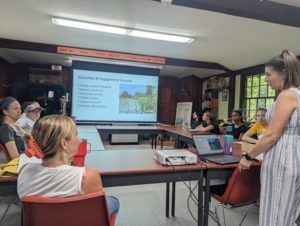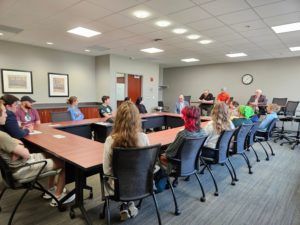MUCC’s AmeriCorps Training: Building Young Professionals
Last week from June 6 th to June 8 th MUCC hosted a three-day elective training at Michigan Out-Of-Doors-Youth Camp. Attendees included AmeriCorps members, Out-of-Doors camp staff and MSU Glassen Scholars from National Wild Turkey Federation and the National Wildlife Federation. The three-day training aimed to teach what being a conservation professional is all about, from different career pathways in natural resources to how crucial conservation-related policies are to our field. This training was supported by a grant from the Abrams Foundation, which helped fund housing and food for the attendees of the training. The Abrams Foundation has supported MUCC for the last decade and we greatly appreciate their support in our goals to protect Michigan’s outdoor heritage.

On the 1 st day of the training, we were focused on careers in natural resources with current professionals speaking about their experiences in the natural resource field. Guest speakers were from MSU Extension, National Wild Turkey Federation, Ducks Unlimited and DNR Marketing and Outreach. Personally, this was extremely helpful to me to see how the speakers navigated their way into the conservation field. They provided helpful tips that my cohorts and I will use for our professional future.
The 2 nd day focused on conservation policy and started with a presentation by MUCC’s policy team on the history of MUCC and its grassroots policy process. After the presentation, we visited the capitol where we met with MUCC’s multi-client lobbyist Bill Jackson, Senator John Cherry and legislative director Katie Olkowski. We finished the day with a tour of the capitol and were lucky enough to see the House of Representatives in session. Learning more about the policy side of conservation was a confusing, but also eye-opening experience.

The 3 rd and final day focused on skill-building including archery and riflery and assisting MUCC camp staff in completing much-needed tasks on the property to help prepare for camp to start on the 19 th . Overall, I thought the experience was great and was much needed for us trying to build our conservation foundations.
The post MUCC’s AmeriCorps Training: Building Young Professionals appeared first on Michigan United Conservation Clubs.
Recent Posts



